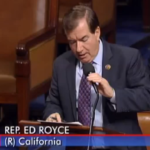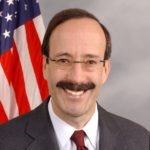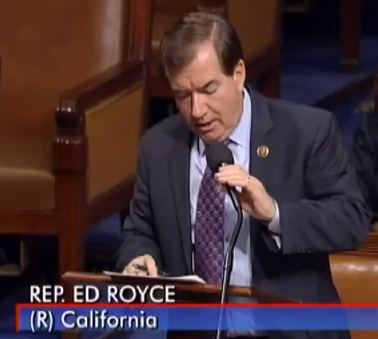BBG Watch Commentary
Voice of America executives were too busy today meeting behind closed doors to decide how to report on the House Foreign Affairs Committee’s bipartisan effort to address their dysfunctional management that they failed to arrange for coverage of Vice President Biden’s speech to the Atlantic Council.
See: Biden announces Obama will visit Poland, other NATO countries — Voice of America not yet reporting, BBG Watch, April 30, 2014.
While VOA executives closely supervised the writing of a news report on the U.S. international broadcasting reform, Vice President Biden’s announcement that President Obama will visit NATO countries in Europe in June was not reported by VOA News for more than four hours while other U.S. and international media outlets were providing their news reports and details of the announcement.

When VOA English News finally posted a very short news item on President Obama’s June trip to Europe, it was not even a VOA report but a dispatch from Reuters. It had five short sentences and did not cover any of Vice President Biden’s comments about NATO’s collective security arrangements to ward off any further aggression from Russia. As of 6:00 PM EDT, the report had only one Facebook “Share.”
Such failures by VOA executives to arrange for prompt and comprehensive coverage of U.S. news and to provide explanation of U.S. policies as required by the VOA Charter have caused members of Congress of both parties to propose reforms in the Broadcasting Board of Governors (BBG) federal agency which oversees the Voice of America and several other U.S. international media outlets.
The House Foreign Affairs Committee unanimously passed bipartisan reform legislation to improve the missions, objectives, and effectiveness of U.S. international broadcasters, such as the Voice of America, Radio Free Europe-Radio Liberty (RFE/RL), Radio Free Asia (RFA), and the Middle East Broadcasting Network (MBN).
In a news report written under close supervision of several VOA senior managers, the entire blame for this reform legislation seems to be attached to the Broadcasting Board of Governors, even though much if not most of the dysfunction has been caused by senior executives of the BBG’s International Broadcasting Bureau (IBB), as well as senior VOA executives who are viewed by employees as some of the worst managers in the federal government.
Members of Congress have accused VOA executives of ignoring the VOA Charter, but this was not reflected in the VOA report. As of 6:45 PM EDT, Voice of America did not update its report to reflect the fact that the bill was passed unanimously by the House Foreign Affairs Committee. The VOA report seems to cast doubt whether the legislation will pass Congress and be signed by the President even though it has strong bipartisan support both in the House and in the Senate, sources told BBG Watch.


U.S. Rep. Ed Royce (R-CA), Chairman of the House Foreign Affairs Committee, and Rep. Eliot Engel (D-NY), the Committee’s Ranking Member, have introduced H.R. 4490, the United States International Communications Reform Act. A House Foreign Affairs Committee press release said that VOA has abandoned its mission of “clear and effective presentation of the policies of the United States.”
Among other things, VOA English News ignored the visit to Ukraine and Armenia by a bipartisan Congressional delegation which was led by Rep. Ed Royce and Rep. Eliot Engel. VOA English News also ignored President Obama’s statements on the genocide of Armenians in 1915, the Holocaust Memorial Day, and the canonization of Popes John XXII and John Paul II.
Rep. Ed Royce delivered opening remarks at a markup of U.S. international broadcast reform, Syria and religious freedom legislation.
On passage of H.R. 4490, Chairman Royce said: “Last week’s visit to Ukraine underscored the need to reform U.S. international broadcasting. The Russian propaganda machine is now in overdrive in its attempts to undermine regional stability. U.S. broadcasters are competing with a hand tied behind their back. That’s because the bureaucratic structure over the top of these radios – the Broadcasting Board of Governors, or BBG – is broken. So while our enemies are working 24/7 on their public information campaigns, the organization at the helm of ours meets once a month. That’s a recipe for failure. This legislation makes dramatic reforms to the current organization to be more effective and efficiently use our finite resources.”
Ranking Member Engel said on April 29: “Around the world, millions of people are denied access to objective news. My recent trip to Ukraine was a strong reminder that the competition of ideas is still very much alive and that the United States has an important role to play in facilitating the free flow of information and in sharing our values. The legislation that Chairman Royce and I introduced will strengthen our international broadcasting operations by improving management, enhancing coordination, and empowering journalists and editors to produce high-quality programming that keeps pace with the rapidly evolving international media landscape.”
ENGEL REMARKS ON U.S. BROADCASTING REFORM LEGISLATION
WASHINGTON, DC—Representative Eliot L. Engel, the leading Democrat on the House Foreign Affairs Committee, today made the following remarks regarding H.R. 4490, the United States International Communications Reform Act:
“Mr. Chairman, thank you for holding this mark-up of bipartisan legislation that will enhance the ability of the United States to facilitate the free flow of information and share our values with people around the world.
“Mr. Chairman, on the recent trip you led to Ukraine, we saw firsthand that the competition of ideas and the battle for hearts and minds are alive and well. Over the past few months, Moscow has used its state-controlled media to broadcast totally baseless propaganda that’s been used as a pretext for Russia’s invasion of Crimea and its destabilizing activities in eastern Ukraine.
“But Ukraine is far from the only place where objective news is in demand. In Iran, the regime closely controls the free flow of information and has actively jammed U.S. satellite transmissions. And in North Korea, the regime locks radios on certain frequencies to prevent people from listening to the Voice of America and Radio Free Asia.
“Unfortunately, our efforts to disseminate objective news to societies that lack a free media are not as effective as they should be. Last year, a report by the State Department Inspector General found that the Broadcasting Board of Governors—the agency that currently oversees all U.S. international broadcasting—was ‘failing in its mandated duties’ due to a flawed structure and strong internal dissension.
“The bill that Chairman Royce and I introduced, with support from many of our colleagues on both sides of the aisle, will help fix this structure by improving management, enhancing coordination among the different broadcasting entities, and empowering journalists and editors to produce high-quality programming that keeps pace with the rapidly changing international media landscape.
“Specifically, the legislation creates a chief executive officer to manage the day-to-day operations of the new U.S. International Communications Agency, an umbrella organization for Voice of America and Office of Cuba Broadcasting. And it also creates a CEO to run the Freedom News Network, a new organization comprised of the three existing private grantees, which are – Radio Free Europe/Radio Liberty, Radio Free Asia, and the Middle East Broadcasting Networks.
“The bill also defines the missions of VOA and the Freedom News Network to reduce the duplication of programming, and requires robust coordination between the federal and private entities—including the sharing of content and strategic plans—to maximize efficiency.
“Under the new organizational structure, Voice of America—VOA, the flagship of U.S. broadcasting for more than 50 years—will remain the primary source of information about the United States and our culture, while the three grantees that form the Freedom News Network will continue to provide news to audiences about developments in their own countries. Only by working closely together will these broadcasters be effective in providing comprehensive news and information to those who need it most.
“When I was recently with Chairman Royce in the eastern part of Ukraine, we met a lot of people who said that they really would welcome more information from the United States… that they really don’t get the balanced type of information. And we know Radio Free Europe and others were the ones that helped the Soviet Union collapse. And so this is a really smart thing for us to do.
“Lastly, and perhaps most importantly, this bill maintains the requirement that U.S.-funded programming serve as objective sources of news and information, and not simply as a mouthpiece for U.S. foreign policy. It’s absolutely critical that the news be accurate and seen as credible by the foreign audiences we’re trying to reach.
“Mr. Chairman, I’d like to thank you again for holding this important markup and really for your leadership over the course of many years on international broadcasting issues. This is one ball that you’ve run with for many years, even before your were chairman of this committee. And it’s very much noticed and very much appreciated. I’d also like to thank you for working with us on this legislation in a bipartisan manner. I have some votes in my other committee so I may be in and out, but this legislation is so important and should be passed with no dissension because I think this is the type of legislation this committee can be proud of, again, on a bipartisan basis.
“Thank you Mr. Chairman.”
The committee considered the legislation at today’s markup.
###
###
VOICE OF AMERICA NEWS
US Lawmakers Mull International Broadcasting Changes
VOA News
April 30, 2014 1:35 PM
A group of U.S. lawmakers is seeking to overhaul the country’s international news and programming broadcasts, saying they should be consistent with and supportive of the country’s foreign policy objectives.
House Foreign Affairs Committee Chairman Ed Royce, a California Republican, said the body that oversees U.S. foreign broadcasting operations, the Broadcasting Board of Governors, is “badly broken” and should be replaced.
Voice of America is overseen by the BBG. If the new legislation passes, it would be governed by a new supervisory body, to be called the U.S. International Communications Agency.
Royce said Wednesday the reorganization is necessary to bolster U.S. broadcasting in the face of growing competition from Russian, Chinese and other foreign international broadcasters.
“Unlike decades past, today’s media landscape is highly competitive. Other countries are sprinting forward. We’re still standing still.”
Eliot Engel, a co-sponsor and the leading Democratic Party member on the committee, stressed the importance that the broadcasting agencies retain their reputation for accurate, unbiased reporting.
“Lastly, and perhaps most importantly, this bill maintains the requirement that U.S.-funded programming serve as objective sources of news and information, and not simply as a mouthpiece for U.S. foreign policy,” he said. “It’s absolutely critical that the news be accurate and seen as credible by the foreign audiences we’re trying to reach.”
VOA Director David Ensor said the organization does not comment on pending legislation. “VOA continues to carry out its important mission providing reliable, accurate and comprehensive news. It currently reaches an estimated 164 million people around the world each week.”
Royce and the Democratic and Republican lawmakers co-sponsoring the legislation are seeking to consolidate some half-dozen U.S. international broadcasting agencies into just two. Their legislation says VOA should focus on coverage of the United States and international developments that affect the U.S.
The bill said VOA should air newscasts that promote and are consistent with “the broad foreign policies of the United States.”
Currently, VOA operates under a 1976 charter that requires that it serve as a “consistently reliable and authoritative source of news” that is “accurate, objective and comprehensive.” The charter also requires that VOA present a balanced and comprehensive projection of significant American thought and institutions.
The measure also says U.S.-funded broadcasting overseas should not duplicate the activities of American commercial broadcasters.
The legislation calls for the existing BBG governors to complete their terms as governors of the new International Communications Agency. However, a new chief executive would be appointed to oversee the agency’s day-to-day operations.
The three U.S. broadcasting arms that target specific regions of the world — Radio Free Europe/Radio Liberty, Radio Free Asia and the Middle East Broadcasting Network — would be merged into a new “Freedom News Network.” The network would focus on providing uncensored local and regional news and analysis to countries where free media do not exist.
The bill would leave VOA as “the flagship brand” of the new agency, offering “accurate, objective and comprehensive” news of the United States, its policies, its people and international developments of interest to the U.S. The Office of Cuba Broadcasting, which operates Radio and TV Marti, would continue its current activities “within” VOA.
The Foreign Affairs Committee started consideration of the reforms Wednesday, but the overall fate of the legislation is uncertain. Even if it is passed in the House of Representatives, it would have to be approved by the Senate and signed by President Barack Obama.
Over the years, numerous U.S. officials have sought to reorganize the government’s international broadcasting operations, often debating whether the United States should provide an independent source of news to countries without a free press or be more an arm of U.S. diplomatic efforts.
One critic was former Secretary of State Hillary Clinton, who is considering whether to seek the Democratic nomination for president in 2016. Before she left office in early 2013, she described the Broadcasting Board of Governors as “practically defunct in terms of its capacity to tell a message around the world.”
